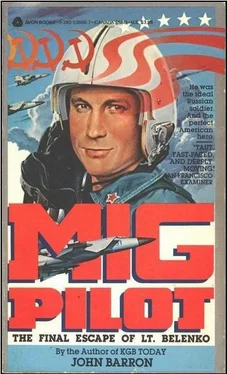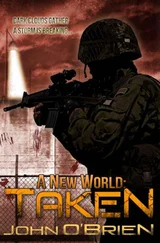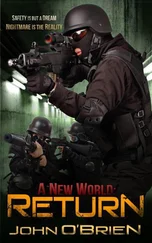On the fifth morning he awakened from a half sleep and saw that during the night the train had entered the rich plains surrounding Armavir. Under the yellow sunshine they were moving through fields of green wheat, then past blooming orchards and vineyards. Bounding from the train as if springing out of a cage, he delighted in the comparative cleanliness, warmth, and gaiety of Armavir. It was an old city with cobblestoned streets, trees, flowers, and a number of colorful prerevolutionary buildings that had withstood war and social change. Among the 200,000 inhabitants were substantial numbers of indomitable Armenians and Georgians and an abnormal proportion of pretty girls, many of whom attended a nursing school or teachers’ college.
The clime was balmy and benign, and wanting to exercise, Belenko jogged to the camp for applicants eight miles outside the city. A spirit of high expectancy and camaraderie pervaded the throngs of young men he joined there. They had traveled from all reaches of the Soviet Union, more than 4,000 of them, lured and united by the hope that they would be chosen to fly. No one told them that the slightest physiological flaw, no matter how irrelevant to health or flying, would disqualify them. No one told them that survivors of the physical scrutiny would have to score almost perfectly on the written tests to have a chance. No one told them that out of the thousands, only 360 would be selected. Consequently, they talked of imminent glories and rewards in the sky, never acknowledging that they might be among the rejected, condemned to two years of harsh servitude as common soldiers. Few complained about the drudging tasks assigned them while they waited their turn to be examined — unloading bricks, digging ditches, laying concrete slabs for runways, weeding fields. This was a small price.
Physicians inspected, probed, pressed, X-rayed, tested, interrogated, and listened to Belenko for five days; then one stamped his medical records “Fit for Flight Training Without Restrictions.” For him, the written examinations assessing basic knowledge of the sciences and Party theory were easy, and he did well. When the names of the first 180 successful candidates were posted in alphabetical order the last week of June, his was there.
The morning Belenko was formally sworn into the Soviet armed forces, a squat sergeant, the right side of his face jaggedly scarred almost from ear to chin, lined him and nineteen other cadets into a squad. Pacing the line, he put his face close to that of every second or third cadet, glowered, and sniffed like a dog. Belenko thought he was either slightly daft or trying to be funny. Suddenly the sergeant stepped back and commenced to revile them, obscenely and furiously. “So, you dripping chickens, you’re in the Soviet Army, and I’m going to tell you something about our Army. They say that life in the Soviet Army is like life in a chicken coop. You know you’re going to get screwed; you just don’t know when, how, and by whom. Well, I’ll tell you when — whenever you do anything different from what I say. You obey me absolutely, day and night, or I’ll have your head as well as your ass. We have another saying. The chicken began to think and wound up in the soup, shit soup. From now on, I think for you. You will think, you will behave, you will look just as I say. Look at your miserable selves; you look just like the scum you are. The next time I see you, I want you to look like Soviet soldiers. I want your boots to be as shiny as the balls of a cat….” In ever more curdling language the abasement and intimidation continued until Belenko concluded the man was serious, that all this was real.
Well, millions of others have been in the same situation. It’s bound to be better when we start flying.
They would not fly, however, for a long while. After completing basic military training, the standard Course for Young Warriors administered to all recruits, the cadets were transferred to an air base on the other side of Armavir. There they began fifteen months of academic studies: science of communism, history of the Party, Marxist/ Leninist philosophy, mathematics, physics, electronics, tactics, navigation, topography, military regulations, and aerodynamics. Classes started at 7:30 A.M., after breakfast and inspection, and continued until 7:30 P.M. six days a week. On Sunday morning they swabbed, swept, or dusted all crannies of the barracks; then a political officer treated them to a two-hour dissertation about current world events.
A television crew preparing a special program about flight training at Armavir filmed the cadets as they took state examinations in September. A couple of days afterward Belenko was summoned to the office of the commandant and informed that because of his handsome appearance and because he ranked first on the exams, he had been designated to appear on the program. A commentator interviewed him before the cameras, and he became something of a celebrity after the program was shown on Armavir television.
The cadets received their first leave in September and vouchers enabling them to fly via Aeroflot anywhere in the Soviet Union for a few rubles. Various friends invited Belenko to stay with their families in Moscow, Leningrad, and Kirov. But a feeling of obligation or the yearning for a sense of family he never had had or a vague hope that things might be different impelled him to visit Rubtsovsk. He appeared in a new blue uniform with the gold, black, and blue shoulder boards of a cadet, emblems denoting that he was, as he looked, a special soldier picked and destined by his country to be much more. The pride he thought he saw in his father’s face momentarily made him proud, and his stepmother fawned over him. They were impressed, and wanting their acquaintances to be impressed, they gave a party ostensibly in his honor. His father’s wartime friend, the truck factory manager, a Party underling assigned to the factory, and a couple of others from the plant were invited. Belenko realized that all were people who might help the family in the future, that the party really was not for him. He did not blame them. He felt only embarrassment at the irreducible emotional distance apparent between him and his father and stepmother whenever they were alone. They had nothing meaningful to say to each other. They did not know each other; they never had and never would. Politely lying about his schedule, he moved out on the third day and looked up friends from high school.
One of his schoolmates had been killed in an automobile accident, and another imprisoned for black marketeering. Two had escaped to Moscow, one was in medical school, and another studying engineering. Most were working in factories, mainly the truck factory. The approbation his uniform and status evoked saddened, rather than heartened, him as he contrasted the richness of his future with the desolation of theirs.
In Omsk, Belenko sought out his best DOSAAF friend, Yuri Nikolayevich Sukhanov, who had grown up pretty much like him, largely forsaken by divorced parents. He remembered him as a tall, broad-shouldered boxer good enough to try out for the 1968 Olympics team, a freespirited hell raiser, and one of the most promising flight students.
Now the sight of him appalled Belenko. He had gained twenty-five pounds, looked fifteen years older, and seemed sapped of all his characteristic vibrance. Nevertheless, he insisted that Belenko share a bottle of vodka in his room, and the entreaties were so earnest Belenko had to accede.
An injury Sukhanov sustained in boxing had permanently impaired his vision, precluding him from passing Air Force physicals and from fighting anymore. He had married a wonderful girl, a secretary at the electronics plant where he worked, and had tried to study electronic engineering at night school. But with the birth of their baby, the combined pressures of work, study, and family overwhelmed him, and he dropped out of school. They could find time for little other than what daily subsistence required. Sometimes food shopping alone, which they could undertake only before or after work, consumed two to three hours because they had to line up at different stores for bread, vegetables, staples, and meat.
Читать дальше












